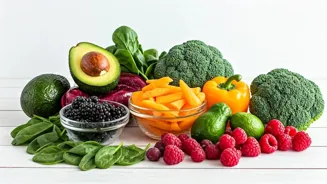Understanding Fatty Liver
Fatty liver disease occurs when excessive fat builds up in the liver, which is primarily responsible for processing nutrients and filtering toxins. The
condition can be caused by factors such as excessive alcohol consumption (alcoholic fatty liver disease) or other issues like obesity and diabetes (non-alcoholic fatty liver disease, or NAFLD). NAFLD is quite common, affecting a significant portion of the population. Over time, if left unaddressed, fatty liver can progress to more severe conditions, including inflammation (steatohepatitis), liver scarring (fibrosis), and even liver failure or cancer. Early detection and lifestyle changes are crucial to managing and potentially reversing the condition. This article offers an in-depth look at the necessary diet changes, including the best foods and lifestyle adjustments, to support liver health.
Top Foods for Health
Your diet significantly influences your liver's health. Incorporating specific foods can help reduce inflammation, lower fat accumulation, and support liver function. Consider adding these ten foods to your diet: 1. **Coffee:** Yes, coffee! Studies show that regular coffee consumption can help protect your liver from damage and reduce the risk of developing fatty liver. 2. **Leafy Greens:** Spinach, kale, and other leafy greens are packed with antioxidants and nutrients, which protect your liver from damage. 3. **Olive Oil:** Replace other fats with olive oil. It contains healthy fats and has anti-inflammatory properties. 4. **Garlic:** This superfood helps lower blood fats and supports liver detoxification. 5. **Whole Grains:** Opt for whole grains over processed ones. They provide fiber, which aids liver health. 6. **Nuts:** Especially walnuts, which are rich in antioxidants. 7. **Avocado:** This fruit is packed with healthy fats and nutrients. 8. **Berries:** Blueberries, strawberries, and other berries are high in antioxidants. 9. **Fish:** Opt for fatty fish like salmon, rich in omega-3 fatty acids. 10. **Tofu:** This plant-based protein source supports liver health.
Foods to Avoid
Just as certain foods benefit your liver, others can be detrimental. Avoiding these items is essential to prevent further damage and support recovery. The following should be limited or removed from your diet: **Sugary Drinks:** Sodas, juices, and other sugary beverages can increase fat buildup in the liver. **Processed Foods:** Fast foods, packaged snacks, and other processed items often contain high levels of unhealthy fats and additives. **Red Meat:** Excessive red meat consumption can worsen liver inflammation. **Fried Foods:** These foods are often high in unhealthy fats that contribute to fat accumulation in the liver. **Alcohol:** If you have fatty liver, alcohol consumption should be limited or eliminated, depending on the advice of your healthcare provider. Following these dietary guidelines is vital for managing fatty liver disease, reducing liver inflammation, and promoting overall liver health. Remember to consult your healthcare provider to develop a plan tailored to your needs.
Lifestyle Adjustments
In addition to dietary changes, lifestyle adjustments can profoundly affect liver health. These changes can complement the diet and aid in managing the condition. The following can promote liver health: **Regular Exercise:** Engage in regular physical activity, such as brisk walking, jogging, or cycling, to improve liver function. Aim for at least 150 minutes of moderate-intensity exercise per week. **Weight Management:** If you're overweight or obese, losing weight can significantly reduce fat in the liver. Even a modest weight loss can have a positive impact. **Limit Alcohol:** Avoid alcohol consumption if you have fatty liver. **Manage Underlying Conditions:** If you have diabetes or high cholesterol, effectively manage these conditions as they can exacerbate fatty liver. **Stay Hydrated:** Drink plenty of water throughout the day to support overall health and liver function. **Get Enough Sleep:** Aim for 7–8 hours of sleep each night. Sleep deprivation can affect liver health. Implementing these lifestyle strategies is a significant step toward improving your liver health and overall well-being.













